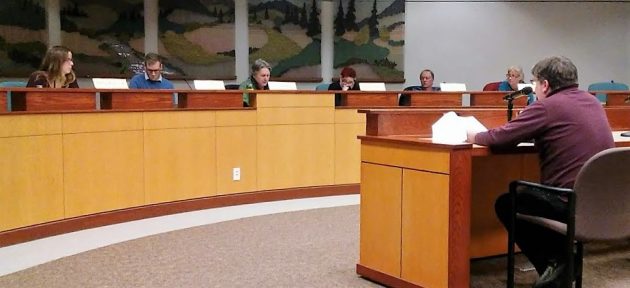
Members of Albany’s Landmarks Advisory Commission listen to a witness, amateur historian Camron Settlemier, at their meeting in February.
The Albany City Council Wednesday stripped Mayor Sharon Konopa of the power to name all the members of several commissions and boards including the Landmarks Advisory Commission.
The action was the culmination of months of discussions during which a majority of council members expressed discontent with the existing setup, in which the mayor made all the appointments subject to council ratification. Rich Kellum and other councilors said they wanted a wider range of viewpoints on the advisory boards.
On Wednesday night the council voted 4-1 to adopt an ordinance making changes in the appointment procedures for boards overseeing parks and recreation, trees, the airport, traffic safety, library, and landmarks. Each council member now will get to appoint one member of each board. Instead of naming all, the mayor also will appoint just one. The new law adds that members of those boards serve at the pleasure of the council and may be removed by majority vote.
A resolution, also passed 4-1, spells out further appointment procedures and says that all members of the volunteer committees must live within the city limits. (The planning commission has nine members. The mayor will appoint three, and each of the six councilors one.)
Current members of any of the boards are not affected by the new provisions until their terms expire.
Konopa called the changes “very unfortunate.” Councilman Dick Olsen voted against them, saying they were unnecessary. Councilors Kellum, Alex Johnson II, Mike Sykes, and Bill Coburn voted yes. Councilor Bessie Johnson was absent but had supported the changes in past discussions.
The council move to change the appointment procedure started last year after the Landmarks Advisory Commission turned down a request to demolish four derelict houses at Fourth Avenue and Calapooia Street, in the Monteith Historic District. The Landmarks majority ruled that applicants Mark and Tina Siegner had not met the requirements in the city code for immediate demolition. It delayed the demolition for a year, thinking that was all it could do.
The Landmarks decision prompted the council to take the case and eventually rule that the demolition could take place after 60 days. But on appeal by an Albany resident, the state Land Use Board of Appeals overturned the council on the grounds that no adequate findings backed its decision and that Kellum was biased and should not have taken part. Also, it said, under state rules the demolition can be denied, not just delayed.
The Siegners have applied for a new hearing before the council, one that LUBA said Kellum could not participate in, but nothing has been scheduled and the old houses remain as they were before. (hh)


Re: Kellum’s Bias….
LUBA’s ruling correctly identified Councilor Kellum as a person of bias. This alleged bias has long been understood by many, particularly those who reside within his realm. Nothing new here.
But isn’t it also true that each of the City’s Moms and Pops have equally distasteful biases? The internal power struggles Hasso documents…the daily push-pull over who pulls the levers of power is most illustrative.
The lurid behind -the-scenes peak Hering takes today is important because determining bias may say more about the accuser than the accused.
It seems odd that a small body of political appointees has the power to declare “bias” and deny an elected local official a vote on a local issue.
Shouldn’t local residents be the people who decide that Kellum made a decision that was not the product of an independent view of the facts?
And kudos to the four councilors who took on the Mayor. The only “unfortunate” here is that the council did not also remove her veto power.
The city charter intentionally created a weak-mayor form of governing. The mayor has no authority to vote (unless a tie) and now has limited authority to appoint or remove committee members. But the mayor still retains veto power over ordinances.
The mayor’s influence should be solely based on personality and ability to influence. All powers of the City should be vested in the council
Everybody carries biases and want to see others agree. The Mayor is no exception. To curtail some of hers via council action is proper use of legislative process. If she wanted, she could overturn Councils decision via an IP and let the voters decide
Depending on the issue, the mayor can also exercise a veto.
DUH…Zzzzzz !